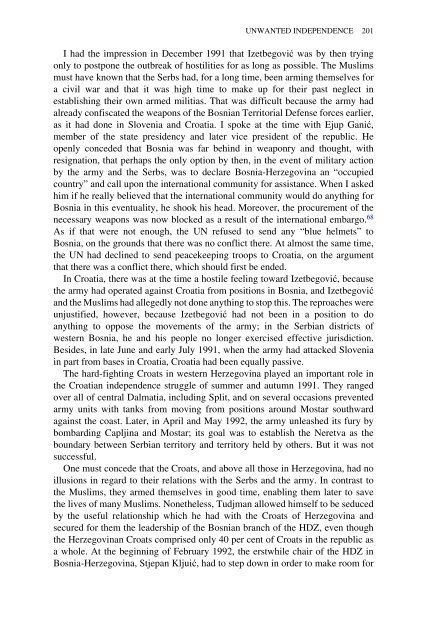Yugoslavia: A History of its Demise - Indymedia
Yugoslavia: A History of its Demise - Indymedia
Yugoslavia: A History of its Demise - Indymedia
You also want an ePaper? Increase the reach of your titles
YUMPU automatically turns print PDFs into web optimized ePapers that Google loves.
UNWANTED INDEPENDENCE 201<br />
I had the impression in December 1991 that Izetbegović was by then trying<br />
only to postpone the outbreak <strong>of</strong> hostilities for as long as possible. The Muslims<br />
must have known that the Serbs had, for a long time, been arming themselves for<br />
a civil war and that it was high time to make up for their past neglect in<br />
establishing their own armed militias. That was difficult because the army had<br />
already confiscated the weapons <strong>of</strong> the Bosnian Territorial Defense forces earlier,<br />
as it had done in Slovenia and Croatia. I spoke at the time with Ejup Ganić,<br />
member <strong>of</strong> the state presidency and later vice president <strong>of</strong> the republic. He<br />
openly conceded that Bosnia was far behind in weaponry and thought, with<br />
resignation, that perhaps the only option by then, in the event <strong>of</strong> military action<br />
by the army and the Serbs, was to declare Bosnia-Herzegovina an “occupied<br />
country” and call upon the international community for assistance. When I asked<br />
him if he really believed that the international community would do anything for<br />
Bosnia in this eventuality, he shook his head. Moreover, the procurement <strong>of</strong> the<br />
necessary weapons was now blocked as a result <strong>of</strong> the international embargo. 68<br />
As if that were not enough, the UN refused to send any “blue helmets” to<br />
Bosnia, on the grounds that there was no conflict there. At almost the same time,<br />
the UN had declined to send peacekeeping troops to Croatia, on the argument<br />
that there was a conflict there, which should first be ended.<br />
In Croatia, there was at the time a hostile feeling toward Izetbegović, because<br />
the army had operated against Croatia from positions in Bosnia, and Izetbegović<br />
and the Muslims had allegedly not done anything to stop this. The reproaches were<br />
unjustified, however, because Izetbegović had not been in a position to do<br />
anything to oppose the movements <strong>of</strong> the army; in the Serbian districts <strong>of</strong><br />
western Bosnia, he and his people no longer exercised effective jurisdiction.<br />
Besides, in late June and early July 1991, when the army had attacked Slovenia<br />
in part from bases in Croatia, Croatia had been equally passive.<br />
The hard-fighting Croats in western Herzegovina played an important role in<br />
the Croatian independence struggle <strong>of</strong> summer and autumn 1991. They ranged<br />
over all <strong>of</strong> central Dalmatia, including Split, and on several occasions prevented<br />
army un<strong>its</strong> with tanks from moving from positions around Mostar southward<br />
against the coast. Later, in April and May 1992, the army unleashed <strong>its</strong> fury by<br />
bombarding Capljina and Mostar; <strong>its</strong> goal was to establish the Neretva as the<br />
boundary between Serbian territory and territory held by others. But it was not<br />
successful.<br />
One must concede that the Croats, and above all those in Herzegovina, had no<br />
illusions in regard to their relations with the Serbs and the army. In contrast to<br />
the Muslims, they armed themselves in good time, enabling them later to save<br />
the lives <strong>of</strong> many Muslims. Nonetheless, Tudjman allowed himself to be seduced<br />
by the useful relationship which he had with the Croats <strong>of</strong> Herzegovina and<br />
secured for them the leadership <strong>of</strong> the Bosnian branch <strong>of</strong> the HDZ, even though<br />
the Herzegovinan Croats comprised only 40 per cent <strong>of</strong> Croats in the republic as<br />
a whole. At the beginning <strong>of</strong> February 1992, the erstwhile chair <strong>of</strong> the HDZ in<br />
Bosnia-Herzegovina, Stjepan Kljuić, had to step down in order to make room for
















